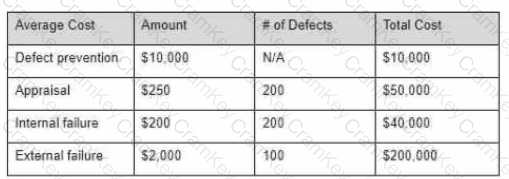Step by Step Comprehensive Detailed Explanation:
Definition of Cost of Quality (CoQ):CoQ is composed of four components:
Prevention Costs:Costs related to activities to prevent defects (e.g., training, quality planning).
Appraisal Costs:Costs associated with evaluating products to ensure defect-free delivery (e.g., testing).
Internal Failure Costs:Costs due to defects found before delivery to the customer (e.g., rework).
External Failure Costs:Costs from defects discovered after delivery (e.g., warranty claims, reputation damage).
Calculation Process:
Defect Prevention Cost:Given as $10,000 (fixed).
Appraisal Cost:$250 per defect for 200 defects = 250×200=50,000250 \times 200 = 50,000250×200=50,000.
Internal Failure Cost:$200 per defect for 200 defects = 200×200=40,000200 \times 200 = 40,000200×200=40,000.
External Failure Cost:$2,000 per defect for 100 defects = 2,000×100=200,0002,000 \times 100 = 200,0002,000×100=200,000.
Total CoQ:Adding all costs together:
Total CoQ=10,000+50,000+40,000+200,000=300,000.\text{Total CoQ} = 10,000 + 50,000 + 40,000 + 200,000 = 300,000.Total CoQ=10,000+50,000+40,000+200,000=300,000.
Correct Answer and Justification:The total cost is$300,000, making Option A the correct answer.
References and Documentation from Advanced Test Management:
ISTQB Advanced Test Management Syllabus v3.0, Section 2.2.2:This section emphasizes understanding and calculating the cost of quality by segregating it into the four components as seen above.
ATM Sample Exam Questions 2024 (Example Calculations):Highlights similar numerical examples to calculate CoQ.
ISTQB Exam Structure Rules v1.9:Ensures alignment with K2-level understanding for cost analysis scenarios in test management.
